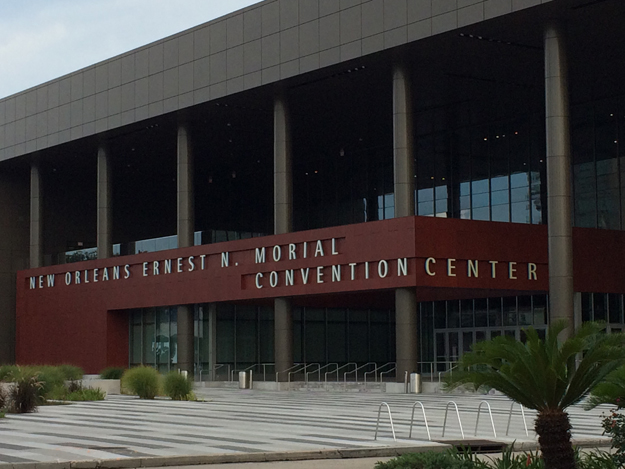
Mayor Cantrell opposes 1,200-room Convention Center hotel proposal
By Kevin Litten
Source: NOLA.com | The Times-Picayune
August 15, 2018
New Orleans Mayor LaToya Cantrell is voicing opposition to a proposal to build a 1,200-room hotel attached to the Ernest N. Morial Convention Center that would include a $41 million contribution from the Convention Center.
Cantrell’s letter comes nearly a month after the Bureau of Governmental Research released a report calling for more scrutiny of the deal, calling it “the largest public contribution to an economic development project involving a private entity in recent memory.” The Convention Center’s board could vote on the deal as early as Aug. 22.
BGR did not take a position on the hotel project in its report.
The $557.5 million proposal for an Omni-branded hotel calls for 40 years of hotel and sales tax rebates, a 100 percent property tax exemption and a lease on Convention Center-owned land that would be provided at no charge, according to BGR. The nonprofit also estimated that when the $41 million contribution is added to the property tax exemption and the free land lease, the subsidy is worth $738.8 million over 40 years.
In exchange for its contribution, the Convention Center would receive profits from the operation of the hotel, and it would become the full owner of the hotel after 40 years, according to the BGR report. In addition, Convention Center officials told BGR that the hotel would “provide other public benefits,” such as increased convention attendance, and keep the facility competitive with other cities.
In Cantrell’s letter, which The New Orleans Advocate first reported, she makes several observations that were also raised in the BGR report. She expressed doubt about whether there was a “strategy around this hotel” and said she has “grave concerns” about the subsidies the project would receive.
“In order to make the best use of limited public resources, projects receiving public contributions should advance priorities set forth in a strategic plan for economic development,” the BGR report said.
“Without such a plan, the public risks supporting low-priority projects, diverting resources that could have been better utilized elsewhere.”
Cantrell said in her letter that there had been little discussion with her administration about subsidies that would require city approval, including a height waiver to build the hotel along the riverfront and waiving city hotel tax revenue.
“Under the current proposal, the developers will be able to build the hotel on free land, pay no property taxes and will be able to enjoy a direct subsidy of over $40 million directly from the Convention Center,” Cantrell wrote. “On top of that, there is a call to waive sales and occupancy taxes worth hundreds of millions of dollars over the life of the hotel. That’s money our citizens cannot afford to do without.”
The BGR report also questioned how Convention Center officials have the authority to approve tax rebates on sales and occupancy taxes. While tourism-related entities such as the Convention Center receive the majority of hotel taxes, the city benefits as well. In a 2016 report, BGR estimated that governmental entities, including the city, public schools and regional transit, collect about one-quarter of the revenue.
Cantrell closed the letter by demanding the Convention Center board defer any action on the project to negotiate an agreement on the size of a subsidy. She also called for revisiting how tax revenue generated in New Orleans is dedicated. Hotel tax revenue flows to the Convention Center, the convention and visitors bureau, the Louisiana Stadium and Exposition District, and the Regional Transit Authority.
In an interview last week, Cantrell’s new chief administrative officer, Gilbert Montano, expressed concern at the amount of tax revenue the tourism industry generates in New Orleans that doesn’t flow into the city’s general fund.
“New Orleans brings in an incredible amount of tourists — the best dollars to have outside coming in” because it isn’t money that is being from residents that’s recycled into the local economy, Montano said. “The … percentage the city of New Orleans receives as compared to the diversion of other tourist dollars should make residents pause a little bit about why we’re not getting more of that revenue.”
Fair Use Notice
This site occasionally reprints copyrighted material, the use of which has not always been specifically authorized by the copyright owner. We make such material available in our efforts to advance understanding of issues and to highlight the accomplishments of our affiliates. We believe this constitutes a “fair use” of any such copyrighted material as provided for in section 107 of the US Copyright Law. In accordance with Title 17 U.S.C. Section 107, the material on this site is available without profit. For more information go to: US CODE: Title 17,107. Limitations on exclusive rights: Fair use. If you wish to use copyrighted material from this site for purposes of your own that go beyond “fair use,” you must obtain permission from the copyright owner.
